Title search results
Showing 1488261 - 1488280 of 1502778 items
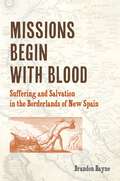
Winner, 2022 Frank S. and Elizabeth D. Brewer PrizeWhile the idea that successful missions needed Indigenous revolts and missionary deaths…
seems counterintuitive, this book illustrates how it became a central logic of frontier colonization in Spanish North America. Missions Begin with Blood argues that martyrdom acted as a ceremony of possession that helped Jesuits understand violence, disease, and death as ways that God inevitably worked to advance Christendom. Whether petitioning superiors for support, preparing to extirpate Native “idolatries,” or protecting their conversions from critics, Jesuits found power in their persecution and victory in their victimization. This book correlates these tales of sacrifice to deep genealogies of redemptive death in Catholic discourse and explains how martyrological idioms worked to rationalize early modern colonialism. Specifically, missionaries invoked an agricultural metaphor that reconfigured suffering into seed that, when watered by sweat and blood, would one day bring a rich harvest of Indigenous Christianity.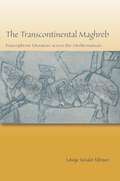
The Transcontinental Maghreb: Francophone Literature across the Mediterranean
By Edwige Tamalet Talbayev. 2017
The writer Gabriel Audisio once called the Mediterranean a “liquid continent.” Taking up the challenge issued by Audisio’s phrase, Edwige…
Tamalet Talbayev insists that we understand the region on both sides of the Mediterranean through a “transcontinental” heuristic. Rather than merely read the Maghreb in the context of its European colonizers from across the Mediterranean, Talbayev compellingly argues for a transmaritime deployment of the Maghreb across the multiple Mediterranean sites to which it has been materially and culturally bound for millennia.The Transcontinental Maghreb reveals these Mediterranean imaginaries to intersect with Maghrebi claims to an inclusive, democratic national ideal yet to be realized. Through a sustained reflection on allegory and critical melancholia, the book shows how the Mediterranean decenters postcolonial nation-building projects and mediates the nomadic subject’s reinsertion into a national collective respectful of heterogeneity. In engaging the space of the sea, the hybridity it produces, and the way it has shaped such historical dynamics as globalization, imperialism, decolonization, and nationalism, the book rethinks the very nature of postcolonial histories and identities along its shores.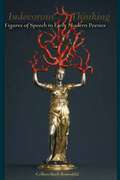
Indecorous Thinking: Figures of Speech in Early Modern Poetics
By Colleen Ruth Rosenfeld. 2018
Indecorous Thinking is a study of artifice at its most conspicuous: it argues that early modern writers turned to figures…
of speech like simile, antithesis, and periphrasis as the instruments of a particular kind of thinking unique to the emergent field of vernacular poesie. The classical ideal of decorum described the absence of visible art as a precondition for rhetoric, civics, and beauty: speaking well meant speaking as if off-the-cuff. Against this ideal, Rosenfeld argues that one of early modern literature's richest contributions to poetics is the idea that indecorous art—artifice that rings out with the bells and whistles of ornamentation—celebrates the craft of poetry even as it expands poetry’s range of activities. Rosenfeld details a lost legacy of humanism that contributes to contemporary debates over literary studies’ singular but deeply ambivalent commitment to form. Form, she argues, must be reexamined through the legacy of figure. Reading poetry by Philip Sidney, Edmund Spenser, and Mary Wroth alongside pedagogical debates of the period and the emergence of empiricism, with its signature commitment to the plain style, Rosenfeld offers a robust account of the triumphs and embarrassments that attended the conspicuous display of artifice. Drawing widely across the arts of rhetoric, dialectic, and poetics, Indecorous Thinking offers a defense of the epistemological value of form: not as a sign of the aesthetic but as the source of a particular kind of knowledge we might call poetic.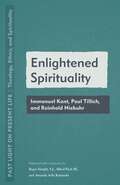
Enlightened Spirituality: Immanuel Kant, Paul Tillich, and Reinhold Niebuhr (Past Light on Present Life: Theology, Ethics, and Spirituality)
By Roger Haight, SJ, Alfred Pach III, and Amanda Avila Kaminski. 2024
This volume presents reflections on the nature of Christian spirituality in the light of Immanuel Kant’s work Fundamental Principles of…
the Metaphysic of Morals. It also contains two short comments on Kant’s work: Paul Tillich directly engages Kant’s moral philosophy, and Reinhold Niebuhr indirectly addresses him with his reflections on the role of conscience in religious experience. The whole volume rests on the constituent role that morality, and hence ethics, plays in a comprehensive understanding of Christian spirituality. Kant adds to that discussion by introducing the voice of the Enlightenment into the conversation. His work serves as a bridge between the spirituality displayed in the Medieval and Reformation periods and what may be called modern Western culture. Christians who are socialized into twenty-first century Western intellectual culture may be relatively unfamiliar with the cultures that spawned the characteristic accents of the spiritual languages that are learned in the churches today. When they move into the world of higher education, they will learn a whole series of ideas from science and critical modern thought that directly challenge the ordinary spiritual conceptions of church traditions. The critical discussion between intellectual culture and Christianity during the period of the Enlightenment was deep and serious, and it helps to explain how the churches in the West relate to present-day intellectual culture. Kant’s text on the metaphysics of morals presents in an exemplary way the deep questions that Christian spirituality faces today with almost laboratory precision. The two commentators neatly draw the conversation into contexts that are closer to life in the world of our time.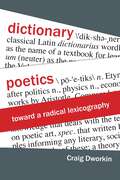
Dictionary Poetics: Toward a Radical Lexicography (Verbal Arts: Studies in Poetics)
By Craig Dworkin. 2020
The new ways of writing pioneered by the literary avant-garde invite new ways of reading commensurate with their modes of…
composition. Dictionary Poetics examines one of those modes: book-length poems, from Louis Zukofsky to Harryette Mullen, all structured by particular editions of specific dictionaries. By reading these poems in tandem with their source texts, Dworkin puts paid to the notion that even the most abstract and fragmentary avant-garde literature is nonsensical, meaningless, or impenetrable. When read from the right perspective, passages that at first appear to be discontinuous, irrational, or hopelessly cryptic suddenly appear logically consistent, rationally structured, and thematically coherent.Following a methodology of “critical description,” Dictionary Poetics maps the material surfaces of poems, tracing the networks of signifiers that undergird the more familiar representational schemes with which conventional readings have been traditionally concerned. In the process, this book demonstrates that new ways of reading can yield significant interpretive payoffs, open otherwise unavailable critical insights into the formal and semantic structures of a composition, and transform our understanding of literary texts at their most fundamental levels.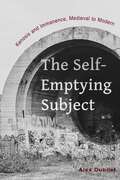
The Self-Emptying Subject: Kenosis and Immanence, Medieval to Modern
By Alex Dubilet. 2018
Against the two dominant ethical paradigms of continental philosophy–Emmanuel Levinas’s ethics of the Other and Michel Foucault’s ethics of self-cultivation—The…
Self-Emptying Subject theorizes an ethics of self-emptying, or kenosis, that reveals the immanence of an impersonal and dispossessed life “without a why.” Rather than aligning immanence with the enclosures of the subject, The Self-Emptying Subject engages the history of Christian mystical theology, modern philosophy, and contemporary theories of the subject to rethink immanence as what precedes and exceeds the very difference between the (human) self and the (divine) other, between the subject and transcendence. By arguing that transcendence operates and subjects life in secular no less than in religious domains, this book challenges the dominant distribution of concepts in contemporary theoretical discourse, which insists on associating transcendence exclusively with religion and theology and immanence exclusively with modern secularity and philosophy.The Self-Emptying Subject argues that it is important to resist framing the relationship between medieval theology and modern philosophy as a transition from the affirmation of divine transcendence to the establishment of autonomous subjects. Through an engagement with Meister Eckhart, G.W.F. Hegel, and Georges Bataille, it uncovers a medieval theological discourse that rejects the primacy of pious subjects and the transcendence of God (Eckhart); retrieves a modern philosophical discourse that critiques the creation of self-standing subjects through a speculative re-writing of the concepts of Christian theology (Hegel); and explores a discursive site that demonstrates the subjecting effects of transcendence across theological and philosophical operations and archives (Bataille). Taken together, these interpretations suggest that if we suspend the antagonistic relationship between theological and philosophical discourses, and decenter our periodizing assumptions and practices, we might encounter a yet unmapped theoretical fecundity of self-emptying that frees life from transcendent powers that incessantly subject it for their own ends.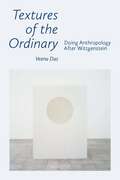
How might we speak of human life amid violence, deprivation, or disease so intrusive as to put the idea of…
the human into question? How can scholarship and advocacy address new forms of war or the slow, corrosive violence that belie democracy's promise to mitigate human suffering? To Veena Das, the answers to these question lie not in foundational ideas about human nature but in a close attention to the diverse ways in which the natural and the social mutually absorb each other on a daily basis. Textures of the Ordinary shows how anthropology finds a companionship with philosophy in the exploration of everyday life. Based on two decades of ethnographic work among low-income urban families in India, Das shows how the notion of texture aligns ethnography with the anthropological tone in Wittgenstein and Cavell, as well as in literary texts. Das shows that doing anthropology after Wittgenstein does not consist in taking over a new set of terms such as forms of life, language games, or private language from Wittgenstein’s philosophy. Instead, we must learn to see what eludes us in the everyday precisely because it is before our eyes. The book shows different routes of return to the everyday as it is corroded not only by catastrophic events but also by repetitive and routine violence within everyday life itself. As an alternative to normative ethics, this book develops ordinary ethics as attentiveness to the other and as the ability of small acts of care to stand up to horrific violence.Textures of the Ordinary offers a model of thinking in which concepts and experience are shown to be mutually vulnerable. With questions returned to repeatedly throughout the text and over a lifetime, this book is an intellectually intimate invitation into the ordinary, that which is most simple yet most difficult to perceive in our lives.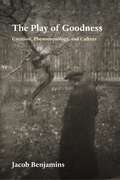
The Play of Goodness: Creation, Phenomenology, and Culture (Perspectives in Continental Philosophy)
By Jacob Benjamins. 2025
One of the enduring claims in the Christian tradition is that creation is good. Given the diversity of experience and…
the abundance of suffering in the world, however, such an affirmation is not always straightforward. The Play of Goodness provides a phenomenology of creation’s goodness that clarifies the ongoing relevance of the doctrine today. It argues that what is “good” about creation is not synonymous with a confession of faith and does not require an overly optimistic disposition, but instead appears within diverse and often surprising circumstances.Alongside original contributions to French phenomenology and creation theology, The Play of Goodness counterbalances a tendency in continental philosophy to focus on negative phenomena. By developing the philosophical concept of a prelinguistic experience of goodness, the book identifies a quality of goodness that is integral to the place in which we find ourselves. It also articulates shared points of contact among people in an increasingly polarized world, while demonstrating that distinctly theological concepts do not need to be presented in opposition to secular, agnostic, or atheist perspectives in order to be relevant. Benjamins develops an account of creation’s goodness that has the potential to animate an abiding affection for one’s place, accentuate our reasons to care for it, and confirm that what happens in our lives is of genuine significance.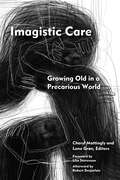
Imagistic Care: Growing Old in a Precarious World (Thinking from Elsewhere)
By Cheryl Mattingly. 2022
Imagistic Care explores ethnographically how images function in our concepts, our writing, our fieldwork, and our lives. With contributions from…
anthropologists, philosophers and an artist, the volume asks: How can imagistic inquiries help us understand the complex entanglements of self and other, dependence and independency, frailty and charisma, notions of good and bad aging, and norms and practices of care in old age? And how can imagistic inquiries offer grounds for critique? Cutting between ethnography, phenomenology and art, this volume offers a powerful contribution to understandings of growing old. The images created in words and drawings are used to complicate rather than simplify the world. The contributors advance an understanding of care, and of aging itself, marked by alterity, spectral presences and uncertainty.Contributors: Rasmus Dyring, Harmandeep Kaur Gill, Lone Grøn, Maria Louw, Cheryl Mattingly, Lotte Meinert, Maria Speyer, Helle S. Wentzer, Susan Reynolds Whyte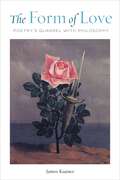
The Form of Love: Poetry’s Quarrel with Philosophy
By James Kuzner. 2021
Can poetry articulate something about love that philosophy cannot? The Form of Love argues that it can. In close readings…
of seven “metaphysical” poems, the book shows how poets of the early modern period and beyond use poetic form to turn philosophy to other ends, in order not to represent the truth about love but to create a virtual experience of love, in all its guises. The Form of Love shows how verse creates love that can’t exist without poetry’s specific affordances, and how poems can, in their impossibility, prompt love’s radical re-imagining. Like the philosophies on which they draw, metaphysical poems imagine love as an intense form of non-sovereignty, of giving up control. They even imagine love as a liberating bondage—to a friend, a beloved, a saint, a God, or a garden. Yet these poems create strange, striking versions of such love, made in, rather than through, the devices, structures, and forces where love appears.Tracing how poems think, Kuzner argues, requires an intimate form of reading: close—even too close—attention to and thinking with the text. Showing how poetry thinks of love otherwise than other fields, the book reveals how poetry and philosophy can nevertheless enter into a relation that is itself like love.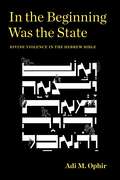
This book explores God’s use of violence as depicted in the Hebrew Bible. Focusing on the Pentateuch, it reads biblical…
narratives and codes of law as documenting formations of theopolitical imagination. Ophir deciphers the logic of divine rule that these documents betray, with a special attention to the place of violence within it. The book draws from contemporary biblical scholarship, while also engaging critically with contemporary political theory and political theology, including the work of Walter Benjamin, Giorgio Agamben, Jan Assmann, Regina Schwartz, and Michael Walzer.Ophir focuses on three distinct theocratic formations: the rule of disaster, where catastrophes are used as means of governance; the biopolitical rule of the holy, where divine violence is spatially demarcated and personally targeted; and the rule of law where divine violence is vividly remembered and its return is projected, anticipated, and yet postponed, creating a prolonged lull for the text’s present.Different as these formations are, Ophir shows how they share an urform that anticipates the main outlines of the modern European state, which has monopolized the entire globe. A critique of the modern state, the book argues, must begin in revisiting the deification of the state, unpacking its mostly repressed theological dimension.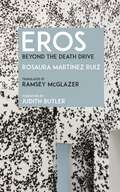
Eros: Beyond the Death Drive
By Rosaura Martínez Ruiz. 2021
Eros considers a promise left unfulfilled in Sigmund Freud’s Beyond the Pleasure Principle. Rosaura Martínez Ruiz argues that when the…
pleasure principle comes into contact with the death drive (the human tendency toward aggression or cruelty), the psyche can take detours that, without going beyond the limit of the pleasure principle, can nevertheless defer it. Eros reflects on these deviations of the pleasure principle, in the political sphere and in the intimate realm. Following these erotic paths, Martínez argues that the forces of the death drive can only be resisted if resistance is understood as an ongoing process. In such an effort, erotic action and the construction of pathways for sublimation are never-ending ethical and political tasks. We know that these tasks cannot be finally accomplished, yet they remain imperative and undeniably urgent.If psychoanalysis and deconstruction teach us that the death drive is insurmountable, through aesthetic creation and political action we can nevertheless delay, defer, and postpone it. Calling for the formation and maintenance of a “community of mourning duelists,” this book seeks to imagine and affirm the kind of “erotic battalion” that might yet be mobilized against injustice. This battalion’s mourning, Martínez argues, must be ongoing, open-ended, combative, and tenaciously committed to the complexity of ethical and political life.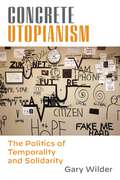
Concrete Utopianism: The Politics of Temporality and Solidarity
By Gary Wilder. 2022
Finalist, 2022 Big Other Book Award for NonfictionNever before has it been more important for Left thinking to champion expansive…
visions for societal transformation. Yet influential currents of critical theory have lost sight of this political imperative. Provincial notions of places, periods, and subjects obstruct our capacity to invent new alignments and envision a world we wish to see. Political imagination is misread as optimism. Utopianism is conflated with idealism. Revolutionary traditions of non-liberal universalism and non-bourgeois humanism are rendered illegible. Negative critique becomes an end in itself. Pessimism is mistaken for radicalism and political fatalism risks winning the day. In this book, Gary Wilder insists that we place solidarity and temporality at the center of our political thinking. He develops a critique of Left realism, Left culturalism, and Left pessimism from the standpoint of heterodox Marxism and Black radicalism. These traditions offer precious resources to relate cultural singularity and translocal solidarity, political autonomy and worldwide interdependence. They develop modes of immanent critique and forms of poetic knowledge to envision alternative futures that may already dwell within our world: traces of past ways of being, knowing, and relating that persist within an untimely present; or charged residues of unrealized possibilities that were the focus of an earlier generation’s dreams and struggles; or opportunities for dialectical reversals embedded in the contradictory tendencies of the given order.Concrete Utopianism makes a bold case for embracing what Wilder calls a politics of the possible-impossible. Attentive to the non-identical character of places, periods, and subjects, insisting that axes of political alignment and contestation are neither self-evident nor unchanging, reworking Lenin’s call to “transform the imperial war into a civil war,” he invites Left thinkers see beyond inherited distinctions between here and there, now and then, us and them. Guided by the spirit of Marx’s call for revolutionaries to draw their poetry from a future they cannot fathom yet must nevertheless invent, he calls for practices of anticipation that envision and enact, call for and call forth, seemingly impossible ways of being together. He elaborates a critical orientation that emphasizes the dialectical relations between aesthetics and politics, political imagination and transformative practice, concrete interventions and revolutionary restructuring, past dreams and possible worlds, means of struggle and its ultimate aims. This orientation requires nonrealist epistemologies that do not mistake immediate appearances with the really real. Such epistemologies would allow critics to recognize uncanny and untimely aspects of social life, whether oppressive or potentially emancipatory. They may help actors to render the world subversively uncanny and untimely. They may clear pathways for the kind of critical internationalism and concrete utopianism that Left politics cannot afford to ignore.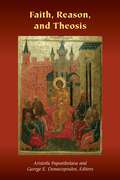
Faith, Reason, and Theosis (Orthodox Christianity and Contemporary Thought)
By Aristotle Papanikolaou and George E. Demacopoulos. 2023
Theosis shapes contemporary Orthodox theology in two ways: positively and negatively. In the positive sense, contemporary Orthodox theologians made theosis…
the thread that bound together the various aspects of theology in a coherent whole and also interpreted patristic texts, which experienced a renaissance in the twentieth century, even in Orthodox theology. In the negative sense, contemporary theologians used theosis as a triumphalistic club to beat down Catholic and Protestant Christians, claiming that they rejected theosis in favor of either a rationalistic or fideistic approach to Christian life.The essays collected in this volume move beyond this East–West divide by examining the relation between faith, reason, and theosis from Orthodox, Catholic, and Protestant perspectives. A variety of themes are addressed, such as the nature–grace debate and the relation of philosophy to theology, through engagement with such diverse thinkers as Thomas Aquinas, John Wesley, Meister Eckhart, Dionysius the Areopagite, Symeon the New Theologian, Panayiotis Nellas, Vladimir Lossky, Martin Luther, Martin Heidegger, Sergius Bulgakov, John of the Cross, Delores Williams, Evagrius of Pontus, and Hans Urs von Balthasar. The essays in this book are situated within a current thinking on theosis that consists of a common, albeit minimalist, affirmation amidst the flow of differences. The authors in this volume contribute to the historical theological task of complicating the contemporary Orthodox narrative, but they also continue the “theological achievement” of thinking about theosis so that all Christian traditions may be challenged to stretch and shift their understanding of theosis even amidst an ecumenical celebration of the gift of participation in the life of God.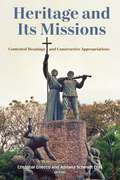
Heritage and Its Missions: Contested Meanings and Constructive Appropriations (Catholic Practice in the Americas)
By Cristóbal Gnecco and Adriana Schmidt Dias. 2025
Explores how heritage discourses and local publics interact at Catholic mission sites in the southwestern United States, northern Mexico, and…
the Southern ConeInterdisciplinary in scope and classed under the name “critical heritage studies,” Heritage and Its Missions makes extensive use of ethnographic perspectives to examine heritage not as a collection of inert things upon which a general historical interest is centered, but as a series of active meanings that have consequences in the social, political, and economic arenas. This approach considers the places of interaction between heritage discourses and local publics as constructed spaces where the very materiality of the social and the political unfolds.Heritage and Its Missions brings together researchers from several countries interested in the pre-republican Catholic missions in the Americas as heritage. Each essay discusses the past and current heritage meanings applied to a specific mission by national and multicultural states, local Indigenous and non-Indigenous communities, international heritage institutions, and scholars. They then address how heritage actors produce knowledge from their positioned perspectives; how different actors, collectives, communities, and publics relate to them; how heritage representations are deployed and contested as social facts; and how different conceptions of “heritage” collide, collaborate, and intersperse to produce the meanings around which heritage struggles unfold.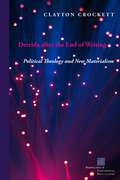
What are we to make of Jacques Derrida’s famous claim that “every other is every other,” if the other could…
also be an object, a stone or an elementary particle? Derrida’s philosophy is relevant not just for human ethical language and animality, but to profound developments in the physical and natural sciences, as well as ecology. Derrida After the End of Writing argues for the importance of reading Derrida’s later work from a new materialist perspective. In conversation with Heidegger, Lacan, and Deleuze, and critically engaging newer philosophies of speculative realism and object-oriented ontology, Crockett claims that Derrida was never a linguistic idealist. Furthermore, something changes in his later philosophy something that cannot be simply described as a “turn.” In Catherine Malabou’s terms, there is a shift from a motor scheme of writing to a motor scheme of plasticity. Crockett explores some of the implications of interpreting Derrida through the new materialist lens of technicity or plasticity, attending to the significance of ethics, religion, and politics in his later work. By reading Derrida from a new materialist perspective, Crockett provides fresh readings of his ideas of sovereignty, religion, responsibility, and mourning. These new readings produce fruitful engagements with the thinkers who have followed Derrida, including Malabou, Timothy Morton, John D. Caputo, and Karen Barad. Here is a new reading of Derrida that moves beyond conventional understandings of poststructuralism and deconstruction, a reading that is responsive to and critical of some of the crucial developments shaping the humanities today.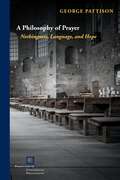
A Philosophy of Prayer: Nothingness, Language, and Hope (Perspectives in Continental Philosophy)
By George Pattison. 2024
Exploring the silence of prayer in Post-Kantian philosophy and traditional spiritualityA Philosophy of Prayer explores prayer within the perspective of…
post-Kantian philosophy. Against a background of traditional sources, including Augustine, The Cloud of Unknowing, and the seventeenth-century French school of spirituality, the book uses Schleiermacher, Kierkegaard, Dostoevsky, Heidegger, Berdyaev, Tillich, Marcel, Simone Weil, Emmanuel Levinas, and Jean- Louis Chrétien to provide an interpretation of what is meant by the passivity and self-annihilation of the praying self, suggesting an “apophatics of the personality.”Pattison pays particular attention to the question of language and the implications of the role given to silence in traditional texts, arguing that language remains a defining element of the human–God relationship and that silence is not to be construed as the negation of language but as the revelation of the depth of language itself. The basic structure of prayer is shown to be implicitly eschatological, oriented toward a coming kingdom of justice and peace while, at the same time, expressing a deep desire for ontological homecoming, a tension manifest in, respectively, Levinas and Heidegger. On Pattison’s reading, prayer calls for and develops a particular orientation of the self toward existence, corresponding to the virtue of humility, long understood as the basic Christian virtue. This is shown to be in tension with modernity’s commitment to strong versions of autonomy. However, the choice of humility is not presented as the reinstatement of religious heteronomy but as a free choice of the praying self.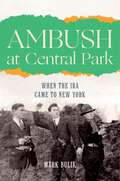
Ambush at Central Park: When the IRA Came to New York
By Mark Bulik. 2023
A compelling, action-packed account of the only officially sanctioned I.R.A attack ever conducted on American soil.In 1922, three of the…
Irish Republican Army’s top gunmen arrived in New York City seeking vengeance. Their target: “Cruxy” O’Connor, a young Irishman who kept switching sides as revolution swept his country in the wake of World War I. Cruxy’s last betrayal dealt a stunning blow to Ireland’s struggle for independence: Six of his IRA comrades were killed when he told police the location of their safe house outside Cork. A year later, the IRA gunned him down in a hail of bullets before a crowd of horrified New Yorkers at the corner of 84th Street and Central Park West.Based primarily on first-hand accounts, most of them never before published, Ambush at Central Park is a cinematic exploration of the enigma of “Cruxy” O’Connor: Was he really a decorated war hero who became a spy for Britain? When he defected to the IRA, did his machine gun really jam in a crucial attack? When captured, did he give up his IRA comrades only under torture? Was he a British spy all along? Or was he pursuing a decades-old blood feud between his family and that of one of his comrades?A longtime editor at The New York Times, author Mark Bulik delved through Irish government archives, newspaper accounts, census data, and unpublished material from the families of the main actors. Together they add to the sensational story of a rebel ambush, a deadly police raid, a dinner laced with poison, a daring prison break, a boatload of tommy guns on the Hoboken waterfront, an unlikely pair of spies who fall in love, and an audacious assassination plot against the British cabinet.Gravely wounded and near death, Cruxy refused to cooperate with the detectives investigating the case. And so, the spy who stopped spying and the gunman who stopped shooting became the informer who wouldn’t inform, even at death’s door. Here is a forgotten chapter of Irish and New York history: the story of the only officially authorized IRA attack on American soil.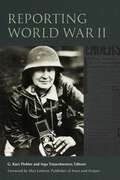
Reporting World War II (World War II: The Global, Human, and Ethical Dimension)
By G. Kurt Piehler and Ingo Trauschweizer. 2023
This set of essays offers new insights into the journalistic process and the pressures American front-line reporters experienced covering World…
War II. Transmitting stories through cable or couriers remained expensive and often required the cooperation of foreign governments and the American armed forces. Initially, reporters from a neutral America documented the early victories by Nazi Germany and the Soviet invasion of Finland. Not all journalists strove for objectivity. During her time reporting from Ireland, Helen Kirkpatrick remained a fierce critic of that country’s neutrality. Once the United States joined the fight after the Japanese attack on Pearl Harbor, American journalists supported the struggle against the Axis powers, but this volume will show that reporters, even when members of the army sponsored newspaper, Stars and Stripes were not mere ciphers of the official line.African American reporters Roi Ottley and Ollie Stewart worked to bolster the morale of Black GIs and undermined the institutional racism endemic to the American war effort. Women front-line reporters are given their due in this volume examining the struggles to overcome gender bias by describing triumphs of Thérèse Mabel Bonney, Iris Carpenter, Lee Carson, and Anne Stringer.The line between public relations and journalism could be a fine one as reflected by the U.S. Marine Corps’ creating its own network of Marine correspondents who reported on the Pacific island campaigns and had their work published by American media outlets. Despite the pressures of censorship, the best American reporters strove for accuracy in reporting the facts even when dependent on official communiqués issued by the military. Many wartime reporters, even when covering major turning points, sought to embrace a reporting style that recorded the experiences of average soldiers. Often associated with Ernie Pyle and Bill Mauldin, the embrace of the human-interest story served as one of the enduring legacies of the conflict.Despite the importance of American war reporting in shaping perceptions of the war on the home front as well as shaping the historical narrative of the conflict, this work underscores how there is more to learn. Readers will gain from this work a new appreciation of the contribution of American journalists in writing the first version of history of the global struggle against Nazi Germany, imperial Japan, and fascist Italy.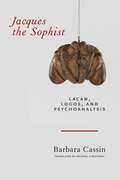
Jacques the Sophist: Lacan, Logos, and Psychoanalysis
By Barbara Cassin. 2020
Sophistry, since Plato and Aristotle, has been philosophy’s negative alter ego, its bad other. Yet sophistry’s emphasis on words and…
performativity over the fetishization of truth makes it an essential part of our world’s cultural, political, and philosophical repertoire. In this dazzling book, Barbara Cassin, who has done more than anyone to reclaim a mode of thought that traditional philosophy disavows, shows how the sophistical tradition has survived in the work of psychoanalysis.In a highly original rereading of the writings and seminars of Jacques Lacan, together with works of Freud and others, Cassin shows how psychoanalysis, like the sophists, challenges the very foundations of scientific rationality. In taking seriously equivocations, jokes, and unfinishable projects of interpretation, the analyst, like the sophist, allows performance, signifier, and inconsistency to reshape truth.This witty, brilliant tour de force celebrates how psychoanalysts have become our culture’s key dissidents and register, in Lacan’s words, “the presence of the sophist in our time.”